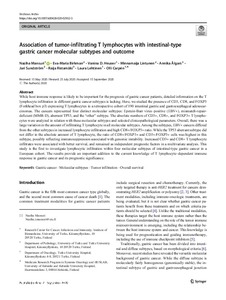Association of tumor-infiltrating T lymphocytes with intestinal-type gastric cancer molecular subtypes and outcome
Heuser Vanina D.; Ålgars Annika; Birkman Eva-Maria; Lehtinen Laura; Mansuri Naziha; Carpén Olli; Sundström Jari; Ristamäki Raija; Lintunen Minnamaija
Association of tumor-infiltrating T lymphocytes with intestinal-type gastric cancer molecular subtypes and outcome
Heuser Vanina D.
Ålgars Annika
Birkman Eva-Maria
Lehtinen Laura
Mansuri Naziha
Carpén Olli
Sundström Jari
Ristamäki Raija
Lintunen Minnamaija
SPRINGER
Julkaisun pysyvä osoite on:
https://urn.fi/URN:NBN:fi-fe2021042822343
https://urn.fi/URN:NBN:fi-fe2021042822343
Tiivistelmä
While host immune response is likely to be important for the prognosis of gastric cancer patients, detailed information on the T lymphocyte infiltration in different gastric cancer subtypes is lacking. Here, we studied the presence of CD3, CD8, and FOXP3 (Forkhead box p3) expressing T lymphocytes in a retrospective cohort of 190 intestinal gastric and gastroesophageal adenocarcinomas. The cancers represented four distinct molecular subtypes: Epstein-Barr virus-positive (EBV+), mismatch-repair-deficient (MMR-D), aberrant TP53, and the "other" subtype. The absolute numbers of CD3+, CD8+, and FOXP3+ T lymphocytes were analyzed in relation with these molecular subtypes and selected clinicopathological parameters. Overall, there was a large variation in the amount of infiltrating T lymphocyte in all molecular subtypes. Among the subtypes, EBV+ cancers differed from the other subtypes in increased lymphocyte infiltration and high CD8+/FOXP3+ ratio. While the TP53 aberrant subtype did not differ in the absolute amount of T lymphocyte, the ratio of CD8+/FOXP3+ and CD3+/FOXP3+ cells was highest in this subtype, possibly reflecting immunosuppression associated with genomic instability. Increased CD3+ and CD8+ T lymphocyte infiltrates were associated with better survival, and remained as independent prognostic factors in a multivariate analysis. This study is the first to investigate lymphocytic infiltration within four molecular subtypes of intestinal-type gastric cancer in a European cohort. The results provide an important addition to the current knowledge of T lymphocyte-dependent immune response in gastric cancer and its prognostic significance.
Kokoelmat
- Rinnakkaistallenteet [19206]
